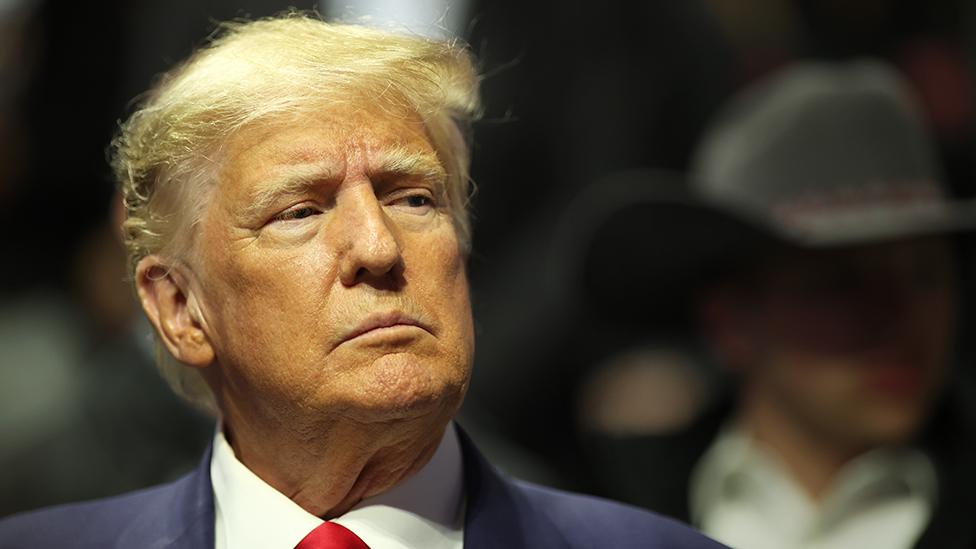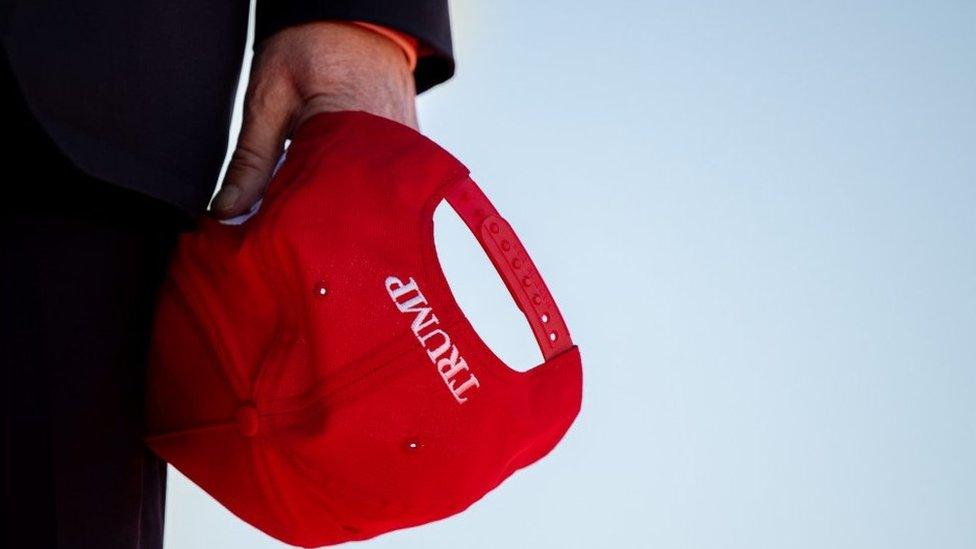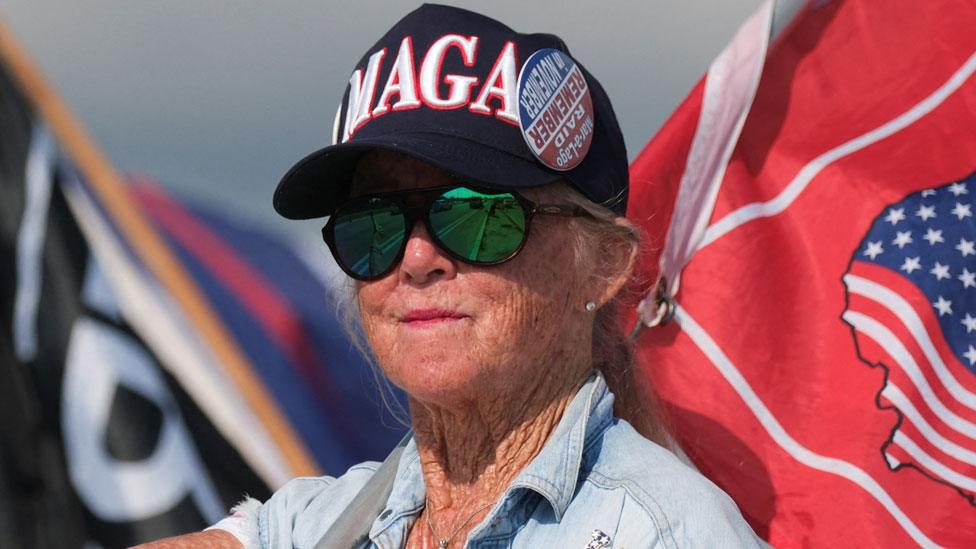Fingerprints, but no mugshot? What we know about Trump's arrest
- Published
Watch: What happens when Trump is arrested - in 70 seconds
Donald Trump faces imminent arrest on charges stemming from an investigation into a $130,000 (£106,000) payment to porn star Stormy Daniels in 2016.
The 76-year-old departed Florida on Monday, landing in New York ahead of his arrest and court appearance on Tuesday.
He is the first former US president to face criminal charges, but it won't be clear what the charges are until the indictment is unsealed at his arraignment.
When will Trump be arrested?
Mr Trump is planning to surrender to authorities on Tuesday, and his arraignment is scheduled for 14:15 local time (19:15 BST). He will likely arrive at the courthouse about an hour or so before that for processing.
The former president is expected first to surrender at the office of Manhattan District Attorney Alvin Bragg.
The usual arrest paperwork will be completed - meaning his details will be taken and investigators will check for any outstanding arrest warrants or charges.
Once Mr Trump is fingerprinted and processed by officials, he is considered under arrest and in custody.
Will there be a 'perp walk'?
A "perp walk" refers to when law enforcement officers walk a suspect up to a courthouse through a public space, giving spectators and the media full view of the arrest.
Was Trump's Stormy Daniels payment legal?
It remains unknown whether Mr Trump will be walked up to the Lower Manhattan courthouse in such a manner ahead of his arraignment, or whether he will be discreetly let in through a side door surrounded by Secret Service agents.
We do know that there will be a massive law enforcement presence around the courthouse and near Trump Tower on Tuesday.
The FBI, New York City police and the US Secret Service are all coordinating security for the proceedings.
Will there be a mugshot of Trump?
It is also unknown whether a mugshot of the former president will be taken when he is booked at the Manhattan courthouse.
According to the New York Police Department, external, a suspect may have their photograph taken at the time of their arrest - but only in some cases, suggesting an element of discretion.
One of Mr Trump's lawyers, Alina Habba, told CNN on Monday that she does not believe a mugshot is needed because the former president is an easily recognisable figure.
"Mugshots are for people so that you recognize who they are. He is the most recognized face in the world, let alone the country right now, so there's no need for that," Ms Habba said.
And on Tuesday, reports in US media suggested that Mr Bragg had decided there was no need to put the 76-year-old through the mugshot process., external
Were the photo to take place, there is no guarantee the public will ever see it. Under New York state law the former president would have to give his approval to its release, though US media has suggested he is not opposed to its publication.
Will Trump be handcuffed?
Reports in US media also said that Mr Trump likely will not be handcuffed, as the Manhattan District Attorney's office has concluded that there is no reason to do so.
Handcuffs are used to prevent a suspect from fleeing or from attacking the district attorney or court personnel.
Mr Trump will be surrounded by law enforcement, including several members of the US Secret Service, therefore the risk of him attempting to flee is fairly low.
What will happen inside the courtroom?
Once Mr Trump is processed, he will likely wait in a holding area until his appearance before Judge Juan Merchan.
Mr Trump will then enter the courtroom and be arraigned - meaning the charges will be read out and he will plead.
His lawyers have said that the former president will plead not guilty to the charges.
The arraignment is open to the public. Members of the media and spectators have lined up overnight outside the courthouse to secure one of 260 tickets to enter the building during the proceedings.
However, no electronics will be allowed inside the courtroom.
Judge Merchan has also ruled that no video coverage will be allowed. He has instead granted access to a few news cameras to take still photos of the scene inside the courtroom several minutes before the arraignment begins.
Watch: Trump supporters gather outside Mar-a-Lago
What will happen after the hearing?
Mr Trump is expected to be released on bail as he is scheduled to return to Florida later in the evening.
It is unclear whether he will head to the airport straight from the courthouse, or if he will stop at Trump Tower before his departure.
One of Mr Trump's lawyers, Chris Kise, told CNN on Tuesday morning that he expects Mr Trump to speak to the cameras in the hallway outside of the courtroom - before and after his arraignment.
Once back at Mar-a-Lago, Mr Trump is expected to address supporters around 20:00 Florida time.
A trial date will also be scheduled for Mr Trump at some point.
The judge and legal teams will set a date for the next hearing and there will also be the process of discovery, in which the district attorney's office must turn over all of its information to Mr Trump's legal team.
In reality, it could take months before another formal hearing takes place.
If there is a trial, a conviction on a misdemeanour would result in a fine. If Mr Trump were convicted on a felony charge, he would face a maximum sentence of four years in prison, although some legal experts predict a fine is more probable and that any time behind bars is highly unlikely.
Mr Trump, who is running for president in 2024, can still continue his campaign if he chooses - there is no US law that prevents a candidate who is found guilty of a crime from campaigning for, and serving as, president - even from prison.

Related topics
- Published5 April 2023

- Published1 April 2023

- Published4 April 2023
